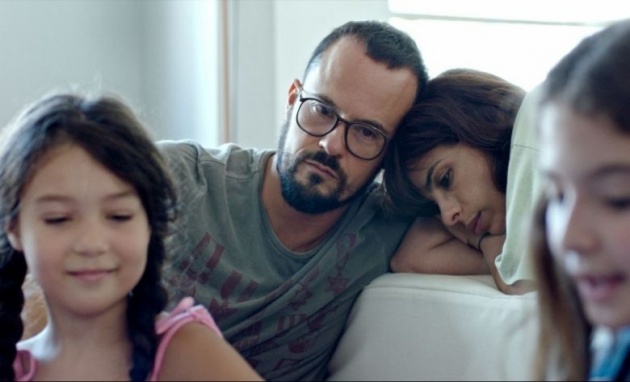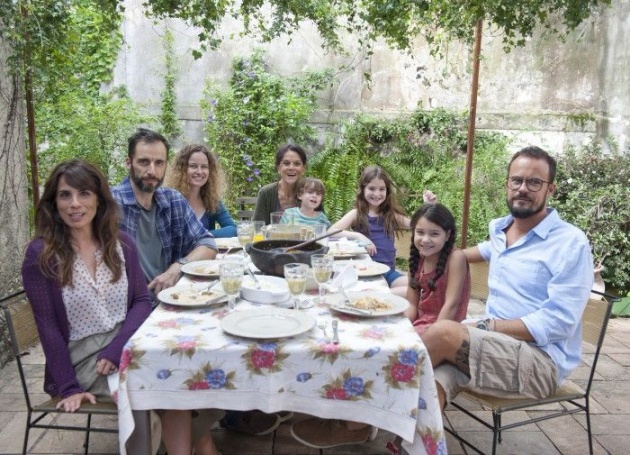Hello everyone! Hope you are all feeling fine and well today! For some months I don't blog on bitLanders and I am kind of missing it and be part of the group again. So, this time I decided to focus on a movie review of a Brazilian movie so you can get to know the art of the place I was born and live in.
Movie credits:
Director: Laís Bodanzky - Production: Globo Filmes and Gullane Filmes - Plot: Laís Bodanzky and Luiz Bolognesi - Crew: Maria Ribeiro, Clarisse Abujamra, Paulo Vilhena and Jorge Mautner - Genre: Drama - Release date: February 11, 2017.

Image source: Blog DWT
Como Nossos Pais (Just Like Our Parents)
The movie shows it is an almost predestinated fact. We awaken from the dreams of adolescence, wrapped up in the characteristic rebellion, and enter into adulthood, drawing us closer and closer to the values and habits inherited from our parents. Social changes occur slowly and become more evident when viewed under the light of history. Like the protagonist Rosa (Maria Ribeiro), when we have the protagonism of the facts, we hardly notice the repetition of behaviors that we criticize. In this way, director Laís Bodanzky gradually guides us through the contradictions between the ideology and the pragmatism of the characters, who envisage a better future, but in practice they are still the same, reproducing unjust social standards, provided they benefit from it.
Among all the nuances of reproduced behavior, what stands out most is male chauvinism, present even among women of history. Rosa's relationship with her mother, Clarice (Clarisse Abujamra), has very aggravating factors that influence the tension between the two, but Clarice's male chauvinism is evident not only when she privileges her son, who could be regarded as a maternal fondness for one of his sons, but when he gives more attention to his son-in-law than Rosa.

Image source: Wiosna Filmow
The daughter is deferred to Dado, played by Paulo Vilhena. The actor, whose career is marked by boisterous attitudes ranging from cast confusion to spitting on a journalist, seems to give life to the character, as Dado also cultivates a good image to conceal reprehensible attitudes. Both actor and character are protected by a status that is not sustained by a closer look. A character who at first seems to be above reproachable behavior is Rosa's father. Homer (Jorge Mautner) has a fun side, referring to an uncompromising hippie who spent his life denying values rooted in the society in which he lives. However, behind their baroque philosophies, the way they find themselves to remain in a capitalist society without selling their labor force is to become a victim in order to live at the expense of women who fall into their lust.
Rosa seems to be the point of support for the abusive and unfair behavior of the other characters. It is no coincidence that she deals with immense guilt, from which she tries to free herself in various ways throughout the film and only for a short time, when she is far from everyone, alone in a hotel room. Guilt is an essential exploration tool. The relations of domination of the film do not occur through hierarchical force or superiority, they affirm with subtlety, involving the character and creating an apparent dependency. For those who watch it is easier to perceive, but for Rosa, the situations experienced seem inevitable and she does not see a way out.

Image source: Wiosna Filmow
The husband gains prominence in the guilt embodied in the character. At home, he gets the easier part of the two daughters' upbringing while leaving the duties on their mother's behalf. It is her who ends up giving up her career to take care of her daughters, the house, her husband, and can freely claim their rights because the claims will not even be considered. It is evident that a couple in these conditions will be in crisis. Rosa does not tolerate the injustices that she lives but ends up suppressing the reactions, absorbing the guilts that Dado throws in her lap and turning into a pressure cooker ready to explode.
At one point the protagonist claims to be "pure interpretation", without realizing that the other characters deserve this label in a much more forceful blunt. They are aware of what the ideal behavior would be, but they refuse to give up the facilities brought by exploitation. Thus, even if some behaviors do not match what the characters advocate through ideology, they do not demonstrate the willingness to change attitudes. There is no radical reaction to situations of tension, there are soft, almost imperceptible reactions of those who want to change without changing the structure of the problem. The small daily explorations that grow and accumulate over time, as the film shows us, can be solved with balance. Rosa offers facilities for people close to her but receives nothing in return. It is a clearly unfair imbalance, which can be corrected with some behavioral changes.
Thank you so much for reading my review and wish you can watch this drama if you have the chance to find it in your hometown. I will be glad to receive all your comments and talk about it with you all!
My very and deeply kind regards,
Manandez.
© 2017 Review written by Manandez. All rights reserved.



